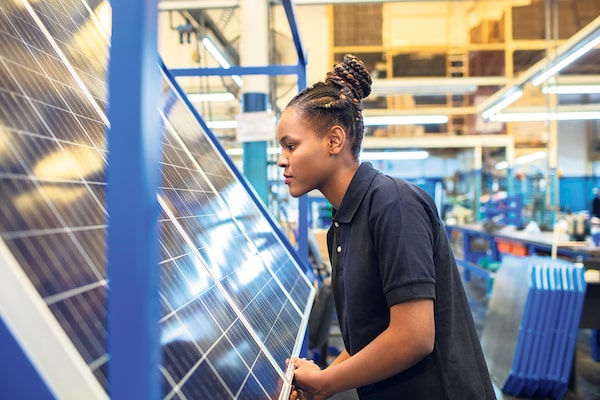
Among the benefits of enhancing Canada’s critical minerals supply is the role these materials play as essential inputs in green technologies, including wind turbines, nuclear energy, solar panels and EV batteries.iStockPhoto / Getty Images
According to World Bank estimates, an up to 500 per cent increase in the production of multiple mineral and metal inputs is required to produce the clean technology essential for limiting rising global temperatures to two degrees Celsius above pre-industrial levels.
While Canada is already well positioned to play a leadership role in providing the materials and critical minerals enabling a low-carbon future, policy support can further boost this potential, suggests Pierre Gratton, president and CEO of the Mining Association of Canada (MAC).
“Among the benefits of enhancing Canada’s critical minerals supply is the role these materials play as essential inputs in green technologies, including wind turbines, nuclear energy, solar panels and EV batteries,” says Mr. Gratton. “Our allies in Europe and the U.S. need reliable supplies from countries with strong environmental, social and governance (ESG) credentials, and few countries can meet this need better than we can.”
Increasing the domestic production of key critical minerals and metals would enable Canada to reduce its reliance on imports while supporting international supply-chain security, he adds.
“A strong commitment to ESG performance is one of the key advantages of the Canadian mining industry, where operations generally have a lower carbon footprint compared to competing mining jurisdictions,” says Mr. Gratton, citing research by SKARN Associates, a consultancy focused on connecting ESG analytics and mineral economics.
By comparing data sets from the majority of global production for nickel, gold, iron ore, metallurgical coal, copper and aluminum on the basis of carbon competitiveness at either the mine site, company or national level, SKARN found that Canada produces some of the lowest carbon-intensity minerals and metals in the world.
Pierre Gratton" Our allies in Europe and the U.S. need reliable supplies from countries with strong environmental, social and governance (ESG) credentials, and few countries can meet this need better than we can.
President and CEO of the Mining Association of Canada
New policy can enhance Canada’s ability to provide the resources needed for advancing low-carbon technology, including the battery materials market, believes Mr. Gratton.
“The introduction of the ‘mines to mobility’ approach to developing Canada’s battery supply chain and the subsequent inclusion of a domestic EV battery supply chain as a pillar under the Strategic Innovation Fund’s net-zero accelerator are encouraging,” he says, “but more can be done to truly seize the opportunity before us.”
Additional measures can include enhancing public geoscience investment focused on supporting mining exploration and doubling the mineral exploration tax credit for exploration focused on critical minerals specifically, Mr. Gratton suggests.
“Since Canada produces some of the lowest carbon-intensity mineral and metal products in the world, we can play a much more significant role in providing the materials the world needs to get to net-zero,” he notes. “A move in that direction would show our commitment as a global leader, both in mining and in climate change.”
Find more information about MAC, the national organization for the Canadian mining industry, at mining.ca
Advertising feature produced by Randall Anthony Communications with the Prospectors & Developers Association of Canada. The Globe’s editorial department was not involved.